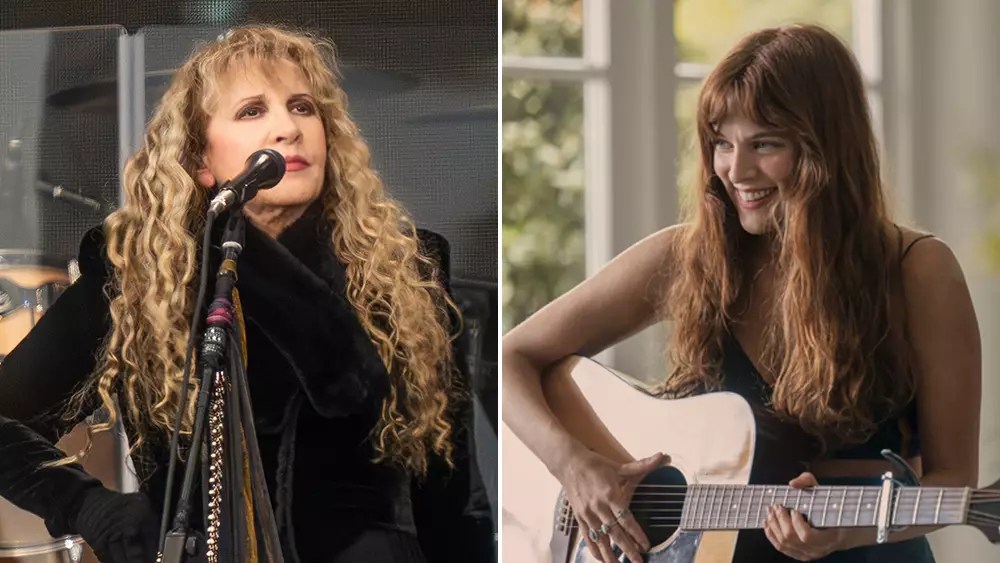Stevie Nicks, one of rock’s most iconic figures, has often found herself in the spotlight for her ethereal voice and enigmatic persona. However, her candid remarks about Prime Video’s adaptation of Taylor Jenkins Reid’s novel, *Daisy Jones & The Six,* reveal a nuanced perspective that embodies both skepticism and appreciation. Initially reluctant to watch the show, Nicks found herself not only drawn in but also inspired by its interpretation of her life experiences, particularly her romance with Lindsey Buckingham of Fleetwood Mac notoriety. This duality—fear of distaste juxtaposed with eventual admiration—paints a compelling picture of Nicks as an artist who is both deeply personal yet critically observant.
Upon finally viewing the series while recovering from COVID-19 at her LA condo, Nicks conveyed a moment of self-reflection. Her viewing experience wasn’t just passive entertainment; it was an introspective journey where she confronted memories of her own past. “Am I just watching my life go by?” she mused, illustrating her wrestling with how much of herself is reflected on screen. This sentiment underscores a larger theme within the show—a blend of fiction and autobiographical elements that taps into the emotional complexities of fame.
Nicks drew comparisons between her character and Riley Keough’s portrayal. While acknowledging the differences, particularly Keough’s more audacious demeanor, she identified similarities in the emotional landscape depicted. This identification illustrates an artist grappling with both her legacy and the fresh interpretations of it, acknowledging how others perceive her story while also providing her unique take.
Nicks’ insights extended to her perceptions of the cast members. She praised Suki Waterhouse’s embodiment of Christine McVie—recognizing the essence of McVie’s English charm and style—and reflected on the missed opportunity for McVie to witness the talent portrayed. Furthermore, Sam Claflin’s portrayal of Billy captivated Nicks, especially in the way it conjured memories of Lindsey Buckingham. Her description of Billy’s physical attributes—specifically the “curls” and “dark handsomeness”—reveals how deeply intertwined her musical legacy is with personal relationships.
Through her compliments, Nicks emphasizes the importance of authenticity in character portrayal while hinting at the legacy of Fleetwood Mac. It’s a celebration of camaraderie rooted in shared history, a narrative not just of music but of emotional bonds that have undergone trials and tribulations over time.
Addressing the potential for a second season, Nicks proposed an intriguing narrative twist involving Billy returning to Daisy after a personal tragedy. This “what if” scenario represents not just a plot device but also a sincere longing within Nicks for closure—an exploration of relationships through the lens of loss and redemption that resonates universally. Her idea for the storyline showcases that the essence of her own experiences can enhance the artistic narrative of *Daisy Jones & The Six.*
Though both Nicks and the show’s producers find themselves tethered by their respective commitments, her enthusiasm shines through despite the logistical challenges. The notion that other creative avenues are always possible remains a stirring possibility. Such an openness exhibits a willingness to collaborate, evoking a sense of community among artists who are anchored by their shared experiences.
*Daisy Jones & The Six* garnered significant recognition during the 75th Primetime Emmys, winning accolades for its period costumes and sound—a testament to the series’ dedication to authenticity in its storytelling. Despite no concrete plans for a second installment, the conversation surrounding potential continuations of the narrative echoes Nicks’ sentiments about artistic collaboration.
Both Nicks’ reflections and the show’s success highlight an interconnectedness that transcends generations. While her life and experiences have shaped the narrative foundation of the series, Nicks functions dually as an observer and a participant—an artist shaped by time yet yearning for the melodies of the past to mitigate the complexities of the present.


Leave a Reply